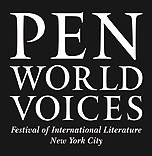“Evolution/Revolution,” PEN World Voices Festival’s opening night last night, offered wordspinning by storytellers in many languages with translation in text scrolling onstage. And new PEN president Kwame Anthony Appiah welcoming the crowd with lyrics from “Cabaret” (“Willkommen, Bienvenue, Welcome,”) and adding a greeting in his Ghanian father’s language.
In this first giddy week of New York spring, Catalonia’s Narcis Comadira‘s poem “Triumph of Life” rang with fresh energy (“you, graceful salamander, queen of the crevice,” “Man, wellspring of terror”). Also pastoral was Raja Shehadeh, whose reading from his memoir, “Palestinian Walks,” focused on a woodland encounter with an Israeli settler in which a gun, a hat, and a filled hashish pipe triggered fear, anger, humor, and human connection. And Quebecois poet Nicole Brossard ended her fine turn with a playful poem structured around the letters “l,” “p,” and “j,” ending with an improvisational fillip—“joie a jouer….”
Muriel Barbery, reading in French from her “The Elegance of the Hedgehog,” drew chuckles at her portrait of a knowing concierge’s ways of keeping her life independent.
Sergio Ramirez,a former vice president of Nicaragua, read a section from his newly translated novel, “A Thousand Deaths Plus One,” in which the photographer called to make the formal portrait of the dead Turgenev also captures a realistic photograph of the writer’s corpse.(X-rated, that one.)
Edwidge Danticat, last year’s NBCC award winner in autobiography for her “Brother, I’m Dying,” read two poems by the late Haitian Creole poet Félix Morisseau-Leroy, who died in Miami 10 years ago. “Tourist” and “Boat People” were sharp-tongued and witty. “I came at 12 to the U.S. from Haiti in the 1980s,” she said. “In my school we were called ‘boat people.’”
Salman Rushdie, founder and continuing overseer of the World Voices Festival , wrapped up the evening with a reading from his 2005 novel “Shalimar the Clown” in which Shalimar is indoctrinated by the “iron mullah” who transforms him into a deadly terrorist motivated above all by ideology.
The chilling image that stayed with me at night’s end was from Hungarian author Peter Nadas‘s 1998 essay “The Great Christmas Killing,” written after watching documentary footage of the execution of Rumanian despots Nicolae and Elena Ceausescu: “Dispassionately I watched myself enjoying the tyrannicide. I kept observing that although I should have been ashamed for enjoying the sight, I was not ashamed at all…” At the end, the documentary cameraman “raises and shows us Nicolae Ceaucescu’s lifeless head.” Nadas concludes, “He pulls down the lower lids so we can look into the dictator’s dead eyes. With this devastating sensory experience we carry the logic of dictatorships into the new millennium.”


